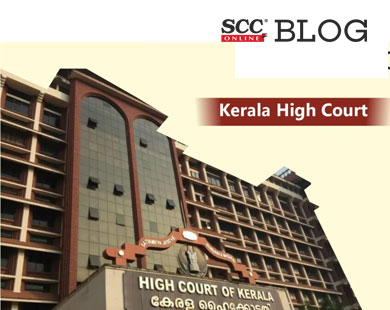Kerala High Court: In an application filed by the applicant/accused for suspension of sentence and to release him on bail, division bench of Alexander Thomas and Sophy Thomas*, JJ. after considering the nature of accusation, seriousness of the offence and its social impact, held that this is not a fit case warranting suspension of sentence and there is no patent infirmity in the order of conviction to render it prima facie erroneous.
The accused was convicted and sentenced for offences punishable under Sections 304-B, 306 and 498-A of the Penal Code, 1860 (‘IPC’) and Sections 3 and 4 of the Dowry Prohibition Act, 1961, and was sentenced to imprisonment for various terms including rigorous imprisonment for 10 years under Section 304-B IPC.
In this case, a 23-year-old girl named Vismaya, who was the wife of the accused committed suicide at her matrimonial home by hanging inside the bathroom, unable to bear the matrimonial cruelties and ill-treatment from the accused, in connection with demand for dowry. The issue in this case is, whether there is any patent infirmity in the order of conviction under Section 304-B of the IPC which renders it prima facie erroneous?
The Court took note of State of M.P. v. Jogendra, (2022) 5 SCC 401, wherein it was held that “the most fundamental constituent for attracting the provisions of Section 304-B IPC is that the death of the woman must be a dowry death”, and further referred to Section 2 definition of ‘Dowry’, in the Dowry Prohibition Act 1961, and said that if there was no property or valuable security given or agreed to be given at or before the marriage, it can be given even at any time after the marriage also.
Placing reliance on State of A.P. v. Raj Gopal Asawa, (2004) 4 SCC 470, the Court said that there need not be any agreement for giving the dowry, and the argument that there has to be an agreement at the time of marriage, in view of the words, “agreed to be given” occurring in Section 2 of the Dowry Prohibition Act, and in the absence of any such evidence, it would not constitute a dowry is not tenable, since the amended definition of dowry in Section 2 of the Act includes not only the period, before and at the time of marriage, but also the period subsequent to the marriage.
Thus, in the present case, even if there was no demand for dowry before or at the time of marriage, the subsequent demand made by him is sufficient to attract the definition of dowry under Section 2 of the Dowry Prohibition Act, 1961. Further, noted that Vismaya died otherwise than under normal circumstances and the death occurred within a period of seven years of her marriage.
The accused submitted that the incidents of physical assault have no proximity with the date of incident. The Court referred to Surinder Singh v. State of Haryana, (2014) 4 SCC 129, wherein it was held that “‘soon before’ appearing in Section 113-B of the Evidence Act, 1872 and in Section 304-B IPC is a relative term, and in matters of emotions, there cannot be a fixed formula. The time-lag may differ from case to case. This must be kept in mind while examining each case of dowry death.”
The Court relied on Preet Pal Singh v. State of U.P., (2020) 8 SCC 645, wherein it was held that “discretion to be exercised judicially and not in a casual manner, while suspending the sentence and releasing the convict on bail, pending appeal” and said that the nature of accusation made against the accused, the way the crime is alleged to have been committed, the gravity of the offence and its social impact are all to be looked into, while considering an application for suspension of sentence and to release the accused on bail. Further, the appellate court is only to examine if there is patent infirmity in the order of conviction, which renders the order of conviction prima facie erroneous, while considering an application for sentence suspension.
The Court said that a young lady had to commit suicide because of the continuous harassment and ill-treatment extended to her, by her husband, on account of demand of dowry from her family. She was very much intending to become a doctor and to have a baby from her husband. The story put forward by the accused that her father did not respond to her messages, menstruation against her expectation of pregnancy etc. are not sufficient, in normal human parlance, for a 23-year-old girl, to end her life, if she was living happily with her husband.
Further, it said that Section 2 of the Act was amended, and Section 304-B dowry death was introduced in the Penal Code with effect from the very same day. Section 113-B presumption as to dowry death was also introduced in the Indian Evidence Act, 1872, on the same day. Thus, the legislative had the strong desire to eradicate the social evil of dowry death from the society using the iron hands of law.
Moreover, the Court said that the father of the deceased has filed an application for enhancement of the sentence and compensation, which is pending consideration by the Court. Therefore, pending appeal, if the sentence is suspended to release the accused on bail, it will send a wrong message to society. Thus, the Court did not allow suspension of sentence to release the accused.
[Kiran Kumar v. State of Kerala, 2022 SCC OnLine Ker 6614, decided on 13-12-2022]
Advocates who appeared in this case :
For Accused: Advocate Priya Shanavas, Advocate T.S. Sarath, Advocate V.C. Sarath, Advocate Mohapraseed Mohan, V. Renjith Kumar;
For State: Advocate S. Rajeev, Advocate V. Vinay, Advocate Sarath K.P., Advocate Aneer M.S, Advocate Prerith Philip Joseph.
*Apoorva Goel, Editorial Assistant has reported this brief.







